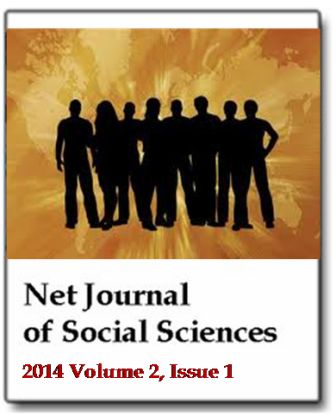Unit-level constructivism: The Japan-Republic of China (Taiwan) can-do-nothing relationship as a case study
Jalel Ben Haj RehaiemNet Journal of Social Sciences
Published: February 3 2014
Volume 2, Issue 1
Pages 24-36
Abstract
In a deviation from the claim of rationalists that international politics is conducted on the basis of rational calculations of predatory actors, international relations, from a constructivist standpoint, are made not only of interests, but also of social identities and social relationships that deeply influence states’ respective foreign policies. Unit-level Constructivism argues that social trends, especially trends in public opinion, are a dependent variable when explaining states’ foreign overtures. This paper posits that this is not usually the case. It is indeed common to see examples of paradoxes between favorable social identities and perceptions, and estranged foreign policies between two states or entities, such as the Japan-Republic of China (Taiwan) relationship case study. Taiwan feels it is under political house arrest, and presumes that Taipei is trying to court more vigorous Japanese support for a greater degree of independence. Why Tokyo is unable to support Taipei’s international bids or upgrade its diplomatic relationship with Taiwan, despite favorable social realities in both countries as successive public opinion polls have consistently shown, is the central question which this work seeks to answer in relation to the Unit-level Constructivist perspective. The analytical approach this work seeks to test is constructivism, especially the unit-level constructivist argument epitomized by Peter Katzenstein. The reason for applying unit-level constructivism is to demonstrate that Japanese and Taiwanese respective social identities and domestic politics, which are mutually sympathetic, have not been translated into tangible political gains that could help break Taiwan’s house arrest, and therefore to draw the attention to the validity of unit-level constructivism regarding the Taiwan-Japan case study. This paper, however, argues that explaining the paradox between what Taipei expects from Japan in standing by Taiwan in its efforts to gain more international recognition and what Tokyo could do in this direction requires exploring the link between three major variables. The first is the paradox between Taipei’s expectations of Japan and of Tokyo’s ability to deliver, despite the mutually positive perception between the Taiwanese and Japanese peoples, recalling Katzenstein’s (1996) argument here. The second variable is the volatile Sino-Japanese relationship as a barometer to fathom the depth of Tokyo’s interaction with Taipei; and the third variable is the U.S. impact on Japan’s options towards Taiwan as a geostrategic variable to which unit-level constructivism pays little attention as a major element in studying interstate relationships.
Keywords: Theories of international relations research, unit-level constructivism, geo-politics, social identities, public opinion.
Full Text PDF
